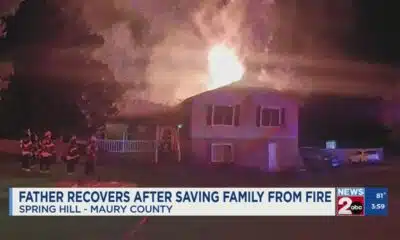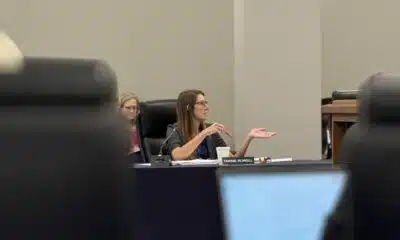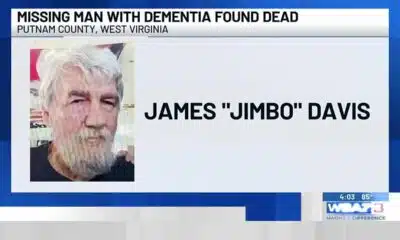News from the South - West Virginia News Feed
McCuskey didn’t join 40 AGs fighting a proposed federal ban on states crafting their own AI laws
McCuskey didn’t join 40 AGs fighting a proposed federal ban on states crafting their own AI laws
by Amelia Ferrell Knisely, West Virginia Watch
May 27, 2025
Attorney General J.B. McCuskey didn’t join 40 other state attorneys general calling on Congress to reject what they call an “irresponsible” federal measure that would block states from setting their own regulations on the use of artificial intelligence for the next 10 years.
Right now, states have the authority to set their own AI rules. The West Virginia Legislature recently passed a bill prohibiting the creation, distribution or possession of AI-generated child pornography.
A letter from the National Association of Attorneys General issued earlier this month said the “broad” AI moratorium measure, which is tucked into President Donald Trump’s tax cut bill, would be “sweeping and wholly destructive of reasonable state efforts to prevent known harms associated with AI.”
McCuskey’s office didn’t respond to questions about why he didn’t sign onto the letter, which included Republicans from Ohio, Tennessee and Virginia.
“This bill does not propose any regulatory scheme to replace or supplement the laws enacted or currently under consideration by the states, leaving Americans entirely unprotected from the potential harms of AI,” the letter read. “Moreover, this bill purports to wipe away any state-level frameworks already in place. Imposing a broad moratorium on all state action while Congress fails to act in this area is irresponsible and deprives consumers of reasonable protections.”
According to an analysis by the National Conference of State Legislatures, 26 states adopted or enacted at least 75 new AI measures. Some of those measures have sought to ban the creation of deepfakes for political campaigns or ban the use of AI to send spam calls or texts.
Republicans in Washington behind the proposed state-level ban say there’s an urgent need to pass a unified, federal set of guidelines after more than 1,000 pieces of legislation relating to AI have been introduced just this year. A 10-year moratorium on state’s enacting AI laws could give Congress the time to pass those guidelines, they say, and the language banning states from setting their own AI regulations was rolled into the 1,100 page controversial budget bill.
Congress would prohibit enforcement of any existing laws on AI and decision-making systems. But Sen. Ryan Weld, R-Brooke, doesn’t think that West Virginia’s new law banning the use of AI in child pornography would be struck down should the federal measure pass because of how it’s written.
The measure, Senate Bill 198, made it a felony offense in West Virginia to use or entice a minor to assist in creating computer-generated images for child pornography or create a visual portrayal of a minor engaging in any sexually explicit conduct. It also bans the distribution of AI-generated child pornography. Weld, an attorney, said it addressed a loophole in the state’s current laws prohibiting child pornography as AI is a growing industry.
“The federal provisions would allow for SB 198 to go into effect because it doesn’t affect laws of general applicability … because [the bill] affects AI, but also it doesn’t discriminate between using artificial intelligence to manipulate an image or create a visual portrayal of a minor … using Adobe Photoshop or something like that,” he explained.
Weld said he was “reluctant” about states potentially losing their ability to regulate AI.
“I don’t like to see states being able to legislate on their own in areas that they generally have the authority to,” he said. “States are the laboratories of democracy for a reason.”
There are limited AI laws in West Virginia, but lawmakers have begun introducing legislation on the topic and exploring how it might work in government. In 2023, the Legislature passed a bill that launched a pilot program to explore how AI could be used to assess road quality and predict maintenance projects.
Last year the House of Delegates created the AI Select Committee that advanced four AI-related bills. Three of those measures died in the Senate, and one resolution, which created an AI Task Force, passed the full Legislature. The AI Task Force was asked to determine the state agency or agencies that would develop AI policies, consider public interest use cases for AI and more. The task force is supposed to submit a report by July.
The National Conference of State Legislatures also opposes the proposed moratorium on states’ ability to regulate AI, saying in a letter to U.S. House members that it “is an infringement on states’ authority to effectively legislate in this rapidly evolving and consequential policy domain, and in our view, is a violation of the Byrd Rule.” The rule — named for late Democratic Senator Robert C. Byrd — governs the budget reconciliation process and provisions deemed “extraneous” are prohibited.
The AI law moratorium measure was packaged with $500 million to modernize federal IT programs with commercial AI systems through 2035.
The U.S. House narrowly approved the GOP-backed massive tax and spending bill with the AI measure on Thursday. Both West Virginia Reps. Riley Moore and Carol Miller, R-W.Va., voted in support of the bill, and it now heads to the U.S. Senate.
In Washington D.C., a House subcommittee earlier this week took its first major step in discussing widespread regulations for AI legislation at the federal level.
Support for federal guidelines or regulation around AI technologies received bipartisan support in the last Congress, States Newsroom reports.
On May 22, McCuskey sent a letter on behalf of 15 attorneys general to the Department of Energy and Federal Energy Regulatory Commission outlining the need “for federal officials to establish a Strategic Electricity Reserve to protect our nation’s energy grid.” It would be used in cases of power shortages or emergencies.
In a news release, McCuskey said, “the reserve will provide a layer of security that is needed now more than ever.”
YOU MAKE OUR WORK POSSIBLE.
West Virginia Watch is part of States Newsroom, a nonprofit news network supported by grants and a coalition of donors as a 501c(3) public charity. West Virginia Watch maintains editorial independence. Contact Editor Leann Ray for questions: info@westvirginiawatch.com.
The post McCuskey didn’t join 40 AGs fighting a proposed federal ban on states crafting their own AI laws appeared first on westvirginiawatch.com
Note: The following A.I. based commentary is not part of the original article, reproduced above, but is offered in the hopes that it will promote greater media literacy and critical thinking, by making any potential bias more visible to the reader –Staff Editor.
Political Bias Rating: Center-Right
This article presents facts about West Virginia Attorney General J.B. McCuskey’s decision not to join other attorneys general in opposing a federal AI moratorium bill. The coverage highlights Republican viewpoints and concerns about state regulatory authority, emphasizing conservative values of state sovereignty and skepticism about federal overreach. It also presents bipartisan context on AI regulation and notes GOP support for a large tax and spending bill containing the AI provisions. The tone remains mostly factual but the focus on GOP legislators and framing of state authority leans moderately toward a center-right perspective.
News from the South - West Virginia News Feed
Black lung cases continue to rise while preventative measures stall out
SUMMARY: Black lung cases continue to rise while preventative measures stall out. Despite the 2024 silica rule aimed at reducing miners’ exposure to harmful silica dust, enforcement has been delayed multiple times due to legal challenges. This delay endangers miners, as black lung disease cases increase, with younger patients showing advanced symptoms. Occupational health experts and retired miners emphasize the urgent need for regulation and monitoring, citing decades of known risks since the 1930s. Budget cuts to safety programs worsen the situation. Advocates stress prioritizing miners’ health over profits, hoping for a future where miners can work safely and live fully.
While cases continue to go up, the medical community is also seeing another troubling trend that black lung is affecting miners at a young age in more significant ways due to more silica exposure from smaller coal seams.
FULL STORY: https://wchstv.com/news/local/as-black-lung-cases-continue-to-climb-silica-rule-delay-leaves-miners-vulnerable
_________________________________________
For the latest local and national news, visit our website: https://wchstv.com/
Sign up for our newsletter: https://wchstv.com/sign-up
Follow WCHS-TV on social media:
Facebook: https://www.facebook.com/eyewitnessnewscharleston/
Twitter: https://twitter.com/wchs8fox11
Instagram: https://www.instagram.com/wchs8fox11/
News from the South - West Virginia News Feed
Protesters in D.C. flood the streets demanding an end to Trump’s military deployment
by Ashley Murray, West Virginia Watch
September 8, 2025
WASHINGTON — Thousands marched in Washington, D.C., Saturday to protest President Donald Trump’s continued deployment of National Guard troops and the increased federal law enforcement on the streets of the nation’s capital.
The large demonstration, dubbed by organizers as the “We Are All DC” march, trailed down the district’s 16th Street NW toward the White House and came after several days of Trump’s heightened threats to send National Guard troops to Chicago, Boston, Baltimore, New Orleans and other Democratic-led cities.
The district’s Democratic attorney general sued the Trump administration Thursday arguing the ongoing presence of National Guard troops amounts to illegal military occupation.
Gail Hansen, 71, of Washington, D.C., joined the “We Are All DC” march Saturday, Sept. 6, 2025, in the District of Columbia. (Photo by Ashley Murray/States Newsroom)
Guard members from the District of Columbia and seven states had already been deployed in Washington as of this week when Georgia Gov. Brian Kemp announced Friday he would add 300 soldiers and 16 support staff, becoming the eighth state to send troops.
On Friday, Trump added Portland, Oregon, to the list of cities where he wants to deploy the Guard.
Demonstrators carried signs bearing the message “End the Occupation,” “Free DC” and “Get the ICE Out,” in reference to recent U.S. Immigration and Customs Enforcement arrests in the district.
Marchers walked down H Street NW in Washington, D.C., on Sept. 6, 2025 during the “We Are All DC” demonstration . (Video by Ashley Murray/States Newsroom)
Dozens of organizations participated in the march, including labor unions, faith-based organizations, immigration advocates, the League of Women Voters D.C. chapter and the D.C. Democratic Party.
Gail Hansen, 71, of Washington, D.C., said she wants to see a decreased ICE presence.
“I believe in freedom, and I think we’ve all gotta let everybody know that what’s happening on our streets is unacceptable,” Hansen told States Newsroom. “ICE needs to go home. The National Guard needs to go home. FBI needs to get out of our streets. We are doing just fine in D.C.”
Charlotte Stone, 18, of Virginia Beach, Virginia, held a cardboard sign above her head depicting a caricature of Trump with a Hitler mustache and a message that read “Ignoring it is what the Germans did.”
Charlotte Stone, 18, of Virginia Beach, Virginia, at the “We Are All DC” march Saturday, Sept. 6, 2025, in the District of Columbia. (Photo by Ashley Murray/States Newsroom)
“I’m disgusted with this country, I’m here with my friends, and we’re freshmen at George Washington University, and we’re disgusted. We need to do something about it,” Stone told States Newsroom.
The Washington Metropolitan Police Department released statistics Tuesday claiming overall crime had decreased by 8% in the district over the previous seven days.
Protesters carry Banksy-style banner depicting a man throwing a sandwich as a nod to former Justice Department employee Sean Dunn, who threw a Subway hoagie at federal agents on Aug. 10 at 14th & U St NW in Washington, D.C. The marchers were part of the “We Are All DC” demonstration on Saturday, Sept. 6, 2025. (Video by Ashley Murray/States Newsroom)
Trump’s 30-day emergency to federalize law enforcement in D.C. ends Sept. 10. On Tuesday, district Mayor Muriel Bowser announced an agreement with the administration to continue a collaboration between local police and federal law enforcement.
A protester pushes a bike carrying two dogs and bearing an American flag and District of Columbia flag at the “We Are All DC” march on Saturday, Sept. 6, 2025. (Photo by Ashley Murray/States Newsroom)
On Saturday morning, Trump posted an AI-generated image of himself with a burning Chicago skyline behind him and a message referring to the 1979 Vietnam War film “Apocalypse Now.”
He wrote on his platform Truth Social, “‘I love the smell of deportations in the morning…’ Chicago about to find out why it’s called the Department of WAR,” in reference to his unofficial renaming of the Department of Defense on Friday.
West Virginia Watch is part of States Newsroom, a nonprofit news network supported by grants and a coalition of donors as a 501c(3) public charity. West Virginia Watch maintains editorial independence. Contact Editor Leann Ray for questions: info@westvirginiawatch.com.
The post Protesters in D.C. flood the streets demanding an end to Trump’s military deployment appeared first on westvirginiawatch.com
Note: The following A.I. based commentary is not part of the original article, reproduced above, but is offered in the hopes that it will promote greater media literacy and critical thinking, by making any potential bias more visible to the reader –Staff Editor.
Political Bias Rating: Left-Leaning
This content primarily highlights protests against former President Donald Trump’s policies, particularly focusing on opposition to the deployment of National Guard troops and federal law enforcement in Democratic-led cities. It features voices critical of Trump and his administration, including references to legal challenges and activist groups aligned with progressive causes. The framing and selection of quotes suggest a perspective sympathetic to the protesters and critical of Trump’s actions, indicating a left-leaning bias.
News from the South - West Virginia News Feed
WEEKEND WEATHER SEPT 7TH
SUMMARY: WEEKEND WEATHER SEPT 7TH: After a rainy day yesterday, Appalachia is now clear with only a few fair weather clouds. Temperatures are in the low to mid-60s due to a recent cold front, bringing lower humidity around 40-50%. Patchy fog may develop late tonight, especially near rivers, with chilly mornings in the 40s and possibly high 30s by Tuesday. Tomorrow’s highs will reach the upper 60s to low 70s with plenty of sunshine, perfect for outdoor activities. The week ahead remains dry and comfortable, with no rain expected and humidity staying low. Temperatures will normalize by week’s end.
FOLLOW US ON FACEBOOK AND TWITTER:
https://facebook.com/WOAYNewsWatch
https://twitter.com/WOAYNewsWatch
-
Mississippi Today7 days ago
Brandon residents want answers, guarantees about data center
-
News from the South - Texas News Feed5 days ago
Texas high school football scores for Thursday, Sept. 4
-
Our Mississippi Home7 days ago
Southern Miss Faculty and Student Contribute to Groundbreaking NOAA-Funded Plastic Cleanup
-
News from the South - Arkansas News Feed7 days ago
Arkansas correction division to enter settlement over disability law violations
-
The Conversation7 days ago
AI is transforming weather forecasting − and that could be a game changer for farmers around the world
-
News from the South - West Virginia News Feed6 days ago
Missing man with dementia found dead
-
News from the South - South Carolina News Feed7 days ago
Trump announces that Space Command is moving from Colorado to Alabama
-
News from the South - Louisiana News Feed4 days ago
Portion of Gentilly Ridge Apartments residents return home, others remain displaced











































